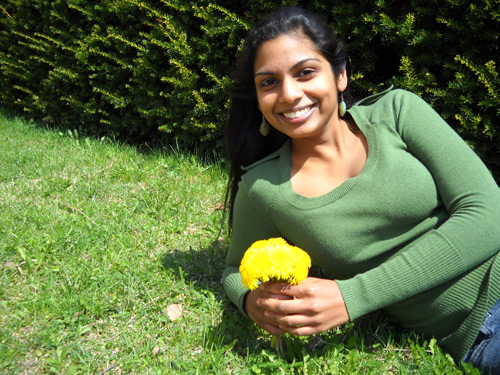
Grow dandelions on purpose? Cynthia Siva can see her parents standing on their carefully cultivated Scarborough greensward and shaking their heads at the idea. But helping home gardeners like them to avoid conventional chemicals and still nurture weed-free lawns is the purpose of research by the master’s student in U of G’s Department of Plant Agriculture.
This spring, she’s cultivating dandelions and other weed species in the Bovey greenhouses and in field plots at the Guelph Turfgrass Institute (GTI). Those plants won’t last long, however. Working with plant agriculture professor Katerina Jordan, Siva is growing those specimens to find the best alternatives to conventional herbicides for getting rid of weeds.
Home and commercial gardeners and lawn-care companies need those remedies more than ever, she says. Last year, Ontario banned cosmetic pesticides and herbicides from lawns and gardens.
“The recent Ontario pesticide ban prohibits use of chemicals for non-essential purposes in residential properties,” says Siva. “There’s a lot of demand for alternative strategies now. People want to be able to manage their turf.”
That includes her dad, who also tends vegetables and fruit trees. Since last year’s ban, “he complains a lot more about the dandelions.”
That’s where plant pathologists like Siva come in. She’ll use her pots and plots to see which combinations of biological controls work best in battling common weeds such as dandelion, clover and plantain. In the greenhouse, she’s using growth chambers to control variables such as temperature, light and humidity. In the GTI field plots, she can test real growing conditions.
Among her products, she’s testing a fungal pathogen called Sclerotinia minor, acetic acid (basically vinegar), an iron-based compound and corn gluten. The latter keeps roots from forming in germinating seeds. U of G researchers, including Jordan, plant agriculture professors Eric Lyons and Francois Tardif and environmental sciences professor Greg Boland, have also looked at these and other substances.
Besides biological controls, Siva will test flaming, or basically blasting weeds with a propane blowtorch. Although she hasn’t seen any home gardeners use flaming, she knows some gardeners douse weeds with vinegar or boiling water, or even rip up and replace lawns outright.
She knows some people look askance at overly zealous lawn-lovers but says there are benefits to well-maintained turf. She lists esthetics, sports and recreation, cushioning falls to prevent injury, providing oxygen and helping to clean the air and surface water. Besides, adds Siva, “seeing green just makes me happy.”
She completed a biological science degree last year and was considering medical school before falling in love with plant pathology: “I wasn’t aware that this world even existed. It was amazing. I didn’t even know plants could get diseases.”
Siva advises gardeners like her dad to fight dandelions by following basic cultural practices for healthy lawns, including proper mowing and watering.